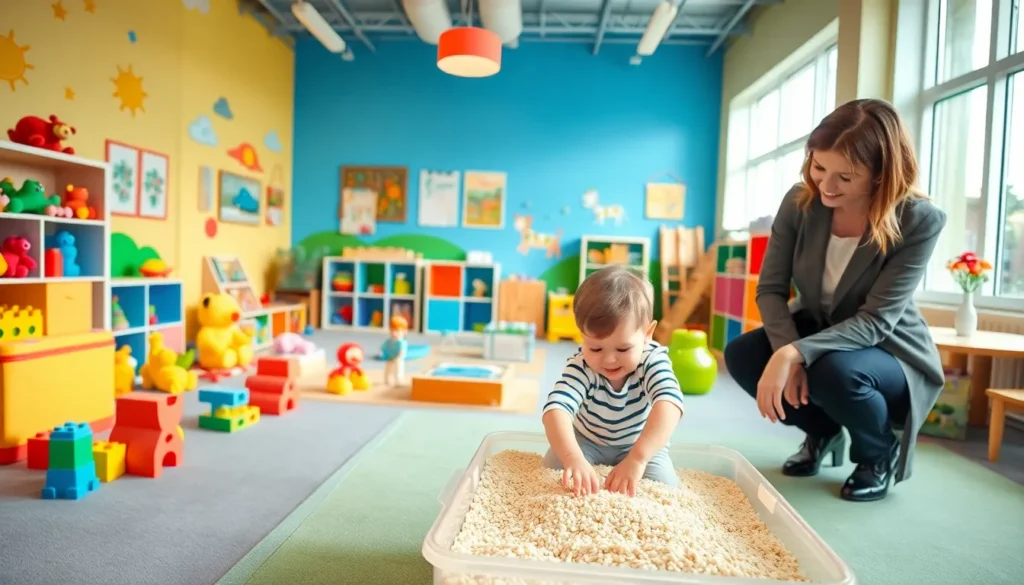Navigating the teenage years can be a challenge for any parent, but co-parenting adds an extra layer of complexity. As adolescents strive for independence, their relationships with both parents can become strained. Effective co-parenting during this pivotal stage is crucial for fostering a supportive environment that promotes emotional well-being and stability.
Understanding the unique dynamics of co-parenting teenagers requires communication, collaboration, and consistency. It’s essential for both parents to stay aligned on rules and expectations while respecting their child’s growing need for autonomy. By embracing a united front, parents can help their teenagers navigate the ups and downs of adolescence, ensuring they feel loved and supported through this transformative period.
Table of Contents
ToggleUnderstanding Co-Parenting Teenagers
Co-parenting teenagers presents unique challenges and opportunities. Effective co-parenting creates a stable environment conducive to emotional growth and independence.
The Importance of Co-Parenting
Co-parenting plays a critical role in a teenager’s development, influencing their behavior and emotional health. Collaborative parents provide consistent support, which builds trust and security. When parents work together, teens experience fewer conflicts and better communication. Research indicates that children with involved co-parents demonstrate improved academic performance and social skills. Prioritizing effective co-parenting fosters resilience in teenagers, aiding them in navigating the complexities of adolescence.
Different Parenting Styles
Different parenting styles significantly impact co-parenting dynamics.
- Authoritative Parenting: Combines high expectations with warmth and support, promoting independence while maintaining guidelines.
- Authoritarian Parenting: Emphasizes strict discipline and control, often leading to rebellion in teenagers.
- Permissive Parenting: Offers flexibility and freedom, sometimes resulting in challenges with boundaries and accountability.
- Uninvolved Parenting: Lacks engagement, which can lead to emotional neglect and strained relationships.
Understanding each other’s styles enhances collaboration. Aligning approaches allows parents to set consistent rules and expectations while addressing the teenager’s evolving need for autonomy. Balancing control and support maximizes positive outcomes for adolescents.
Challenges of Co-Parenting Teenagers

Co-parenting during the teenage years involves unique challenges that can strain relationships between parents. Awareness and proactive strategies are essential for managing these difficulties effectively.
Communication Breakdown
Communication breakdowns frequently occur in co-parenting situations. Parents must communicate openly and consistently, which requires shared methods for discussing issues and decisions. Misunderstandings can arise from differing interpretations of rules or expectations. Each parent should utilize clear and direct language when addressing rules, schedules, and other significant matters. Regular check-ins between parents encourage alignment and help identify potential conflicts before they escalate. Utilizing communication tools, such as co-parenting apps, aids in sharing important information and fostering collaboration.
Navigating Conflicts
Navigating conflicts can create stress for both parents and teenagers. Disagreements often stem from differing parenting styles or responses to a teenager’s behavior. Parents should approach conflict resolution with a mindset focused on collaboration rather than competition. Techniques such as active listening and empathy promote understanding between parents. When conflicts arise, it’s vital to prioritize the teenager’s emotional needs, allowing them to voice their opinions while keeping parental authority intact. Approaching disagreements with respect and a commitment to compromise strengthens co-parenting dynamics and provides stability for the teenager.
Effective Co-Parenting Strategies
Co-parenting teenagers requires specific strategies to ensure effective collaboration and a positive environment. The following approaches can help parents navigate this complex stage.
Maintaining Consistency
Maintaining consistency across co-parenting is crucial for providing stability to teenagers. Consistent rules, routines, and disciplinary actions reduce confusion and create structure. Parents must align on core guidelines, including curfews, chores, and communication expectations. Utilizing shared calendars helps manage schedules and notify both parents about important events. Regular discussions foster open dialogue about any necessary adjustments, ensuring both parents remain on the same page.
Supporting Teen Independence
Supporting a teenager’s quest for independence is essential for their development. Parents can encourage autonomy while setting clear boundaries. Open conversations about responsibilities and decision-making allow teenagers to express their opinions. Involving them in discussions about rules fosters a sense of ownership and responsibility. Acknowledging accomplishments, no matter how small, builds their confidence and encourages further independence. This balance between support and space enables teenagers to learn and grow in a safe environment.
Resources for Co-Parents
Co-parents can benefit from various resources that support effective collaboration and communication. These tools facilitate better understanding and navigation of the co-parenting journey during the teenage years.
Books and Articles
- “Co-Parenting After Divorce: A Guide for Parents” by Amy J. L. Shein. This book offers insights into handling co-parenting challenges, including managing teens’ emotions.
- “The Co-Parents’ Handbook” by Karen Bonnell. This resource addresses strategies for maintaining unity between parents while respecting teenagers’ autonomy.
- “How to Raise a Teenager” by John Rosemond. This article provides practical approaches for managing teenagers’ evolving needs, emphasizing communication and consistency.
- Online articles on websites like Psychology Today and Verywell Family cover recent research and tips on co-parenting dynamics during adolescence.
Support Groups and Workshops
- Online Support Groups: Platforms like Co-Parenting International offer virtual forums for parents to share experiences and strategies.
- Local Parent Workshops: Many communities conduct workshops focusing on co-parenting techniques aimed at enhancing cooperation between parents.
- Support Networks: Organizations such as Parents Without Partners provide local chapters that facilitate discussion groups, enabling parents to connect and learn from each other.
- Counseling Services: Family therapists often offer co-parenting classes designed to improve communication skills and conflict resolution strategies tailored for co-parents.
Co-parenting teenagers presents unique challenges that require patience and understanding. By fostering open communication and collaboration parents can create a nurturing environment that supports their child’s growth. It’s essential to recognize the importance of consistency in rules and routines while allowing teenagers the freedom to express their independence.
Utilizing resources and strategies can enhance the co-parenting experience, helping parents navigate conflicts and strengthen their partnership. Ultimately, a united approach not only benefits the parents but also empowers teenagers to thrive during this transformative stage of their lives.




